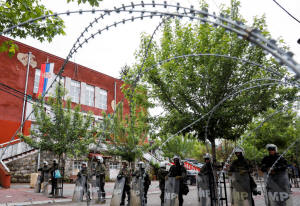NATO-led troops guard town hall in northern Kosovo
 Send a link to a friend
Send a link to a friend
 [May 31, 2023]
By Fatos Bytyci [May 31, 2023]
By Fatos Bytyci
LEPOSAVIC, Kosovo (Reuters) - NATO peacekeepers stood behind a
razor-wire barrier that prevented the approach of protesters outside a
municipal hall in ethnically divided northern Kosovo, where days of
unrest have prompted NATO to send additional troops to stave off
violence.
Following clashes on Monday in Zvecan, another northern town, during
which 30 NATO troops and 52 ethnic Serbian protesters were hurt, NATO
said it would send 700 more troops to Kosovo to boost its 4,000-strong
mission. It was not clear when the soldiers would arrive.
Polish soldiers of NATO stood guard at the town hall in Zvecan on
Wednesday, as demonstrators on the other side of the fence unfurled a
large Serbian flag to applause and whistles.
Regional unrest has intensified following April elections that the
ethnic Serbs boycotted, narrowing the turnout to 3.5% and leaving
victory in four Serb-majority Kosovan mayoralties to ethnic Albanian
candidates.
Those ethnic Albanian mayors were then installed last week, a decision
that spurred rebuke of Pristina by the U.S. and its allies on Friday.

The ethnic Albanian mayor of Leposavic, another northern Kosovo town,
remained in the municipal building on Wednesday after entering it amid
Serb demonstrations on Monday. He couldn't immediately be reached for
comment.
"While they may have been legally elected, we do not consider their
election legitimate," Dragan, an ethnic Serb who lives in Leposavic,
told Reuters on Wednesday.
"We're asking what the international community is asking – for them to
be removed from here peacefully," he said.

KOSOVO REBUKED
The United States and allies have rebuked Kosovo for escalating tensions
with Serbia, saying the use of force to install mayors in ethnic Serb
areas of Kosovo undermined efforts to improve troubled bilateral
relations.
That view was achoed by French President Emmanuel Macron, who said on
Wednesday the unrest "has increased sharply since ethnic Albanian mayors
took office."
[to top of second column]
|

Polish members of the NATO-led Kosovo
Force (KFOR) stand guard near a municipal office in Zvecan, Kosovo,
May 31, 2023. REUTERS/Ognen Teofilovski

Speaking at a briefing in Bratislava, Macron said he hoped to meet
German Chancellor Olaf Scholz and the leaders of Kosovo and Serbia
later this week for discussions on the matter.
Kosovo Prime Minister Albin Kurti on Wednesday blamed Belgrade for
being behind protests in the north in order to destabilise Kosovo.
Separately, Kosovo Olympic authorities asked the International
Olympic Committee (IOC) to open disciplinary proceedings against
Serbian tennis star Novak Djokovic, accusing the Serbian of stirring
up political tension with remarks he made at the French Open.
Djokovic wrote "Kosovo is the heart of Serbia" on a camera lens on
Monday, the day NATO troops and Serbians were hurt in clashes in
Zvecan, where his father father grew up.
Kosovo tennis federation chief Jeton Hadergjonaj said despite a
general message against violence, Djokovic's remark on Kosovo being
the "heart of Serbia" could ramp up tensions between Serbia and
Kosovo.
Serbian President Aleksandar Vucic placed his army on full combat
alert and ordered units to move closer to the border.
Northern Kosovo's majority Serbs have never accepted Kosovo's 2008
declaration of independence from Serbia, and consider Belgrade their
capital more than two decades after the Kosovo Albanian uprising
against repressive Serbian rule.
Ethnic Albanians make up more than 90% of the population in Kosovo
as a whole, but northern Serbs have long demanded the implementation
of an EU-brokered 2013 deal for the creation of an association of
autonomous municipalities in their area.
Peacekeeping troops were deployed in Kosovo in 1999 after NATO
bombing drove Serbia's police and army out of its former province.
(Reporting by Fatos Bytici and Ivana Sekularac; Editing by
Bernadette Baum)
[© 2023 Thomson Reuters. All rights
reserved.]This material may not be published,
broadcast, rewritten or redistributed.
Thompson Reuters is solely responsible for this content.
 |